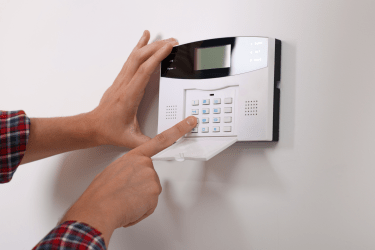Top Home Security Systems for Every Budget

Top Home Security Systems for Every Budget
Home security is one of those crucial aspects that no homeowner should overlook. It’s not just about safeguarding your property but also about ensuring the safety and well-being of your loved ones. Today, we’re diving deep into the world of home security systems that cater to every budget. Whether you’re a homeowner aiming for a robust security setup or someone looking to invest smartly without breaking the bank, this guide is for you.
The first step to effective home security is understanding your needs and balancing them with what you can afford. When it comes to budgeting tips for home security, it’s essential to conduct a thorough cost-benefit analysis. This means weighing the costs of various systems against the benefits they offer, ensuring you get the most bang for your buck. As you navigate through this article, we’ll explore how you can efficiently budget for home security and make informed decisions that keep your home safe without stretching your finances too thin.
Understanding the Importance of Home Security
Before we delve into the specifics of various home security systems, let’s take a moment to understand why home security is paramount. In today’s world, where burglaries and unauthorized entries are not uncommon, having a reliable home security system offers peace of mind.
Understanding the Cost-Benefit Analysis of Home Security Systems

Understanding the Cost-Benefit Analysis of Home Security Systems
In today’s world, safeguarding your home is more important than ever. With the rise in crime rates and the increasing number of break-ins, investing in a reliable home security system has become a necessity for many homeowners. But before you dive into purchasing one, it’s essential to conduct a thorough cost-benefit analysis. This will not only help you make an informed decision but also ensure that you manage home finances effectively, thereby providing peace of mind and financial stability. Considering both the initial investment and the long-term benefits can guide you to the best choice for your household.
The Importance of Home Security Systems
Home security systems are designed to protect your home from various threats, including burglaries, fires, and even carbon monoxide poisoning. These systems come equipped with a range of features such as alarms, surveillance cameras, motion detectors, and smart locks. The primary goal is to deter potential intruders and provide real-time alerts in case of any suspicious activities. Understanding the importance of these systems can help you appreciate their value beyond the upfront costs.
Key Features of Modern Home Security Systems
When evaluating home security systems, it’s crucial to understand the features they offer.
Cybersecurity Tips for Protecting Your Financial Data

Cybersecurity Tips for Protecting Your Financial Data
In today’s interconnected world, the importance of cybersecurity cannot be overstated. With cyber threats evolving at lightning speed, businesses and individuals alike must stay vigilant to protect their sensitive information. Among the most valuable data that needs safeguarding is financial information. Whether you’re a business owner managing client transactions or an individual keeping track of your personal finances, implementing robust financial data protection measures is essential. From phishing attacks to sophisticated malware, the risks are manifold. This article delves into practical and effective cybersecurity tips to help you shield your financial data from malicious actors.
Understanding the Importance of Digital Security
With the digital landscape expanding rapidly, the term “digital security” has become synonymous with safe online practices. Implementing strong digital security measures is no longer optional; it’s a necessity. Ensuring that your financial data is protected from breaches and unauthorized access requires a comprehensive approach that encompasses various aspects of cybersecurity.
Common Cyber Threats
Before diving into the tips, let’s take a look at some common cyber threats that target financial data:
Phishing Attacks
Phishing remains one of the most prevalent methods hackers use to steal financial information. These attacks often come in the form of deceptive emails or messages designed to trick recipients into revealing sensitive data.
Comprehensive Financial Planning Strategies for Home Security

Comprehensive Financial Planning Strategies for Home Security
In today’s world, the concept of home security extends far beyond just locks and alarms. A truly secure home is one where safety measures are intertwined with a robust financial plan. This approach ensures not only the physical protection of your household but also its financial stability. As our homes become smarter and more connected, the need to align home finances with security measures becomes crucial. By integrating financial planning strategies with cutting-edge home security systems, you can create a fortress that safeguards both your loved ones and your assets. Understanding how to navigate this intersection of finance and security will set you on a path to peace of mind, knowing that every aspect of your home is protected.
The Intersection of Financial Planning and Home Security
Why Financial Planning Matters
Financial planning is the backbone of a secure life. Without a secure financial plan, even the most advanced home security systems fall short. It’s essential to budget for both immediate and long-term security expenses. This involves understanding the costs associated with installing, maintaining, and upgrading your security systems. A well-thought-out financial plan should account for periodic updates and potential emergencies, ensuring that your home remains protected at all times.
Leveraging Home Equity Loans for Security Upgrades

Leveraging Home Equity Loans for Security Upgrades
In today’s fast-paced world, ensuring the safety and security of your home is paramount. One of the often-overlooked avenues to enhance home security is through the strategic use of home equity loans. By tapping into your home’s equity, you can access necessary funds without the high interest rates associated with other financial products. This approach not only provides the capital for comprehensive security upgrades but also offers a secure financial plan tailored to your needs. Whether you’re looking to install advanced surveillance systems, reinforce entry points, or integrate smart home
technologies, leveraging home equity loans can be a game-changer in fortifying your residence against potential threats. For more insights on home loans and how they can benefit you, check out home loans.
Understanding Home Equity Loans
Home equity loans are a type of loan that allows homeowners to borrow against the equity they have built up in their property. Essentially, this means that your home acts as collateral, enabling you to secure funds based on the value of your home minus any outstanding mortgage balance. These loans come with several advantages, including lower interest rates compared to personal loans or credit cards, making them an attractive option for financing larger projects like home security upgrades.
Financial Planning for Young Professionals

Financial Planning for Young Professionals
Financial planning is a crucial aspect of ensuring a stable and secure future, especially for young professionals who are at the early stages of their careers. By understanding the fundamentals of financial planning and analysis, individuals can lay a strong foundation for long-term financial success. This article delves into the key components of financial planning, the financial planning process, and the importance of having a well-defined financial plan.
Understanding Financial Planning and Analysis
Financial planning involves the assessment of an individual’s current financial situation, setting financial goals, and creating a roadmap to achieve those goals. Financial analysis plays a vital role in this process by examining income, expenses, investments, and other financial aspects to make informed decisions. For young professionals, financial planning and analysis serve as guiding principles to manage income effectively, save for the future, and build wealth over time.
The Financial Planning Process
The financial planning process typically consists of several key steps that young professionals should consider:
- Setting Financial Goals: Establish clear and achievable short-term and long-term financial goals, such as saving for a home, starting a business, or retirement planning.
- Assessing Financial Situation: Evaluate current income, expenses, assets, liabilities, and investment portfolio to understand your financial position.
Effective Debt Management for Better Home Security Financing

Effective Debt Management for Better Home Security Financing
Managing debt effectively is crucial not only for your financial well-being but also for enabling significant investments, such as home security upgrades. This article will explore the importance of debt management, how it can impact your ability to finance home security improvements, and practical tips for achieving effective debt management.
The Importance of Debt Management
Enhances Financial Stability
Effective debt management enhances your overall financial stability. By keeping your debt levels in check, you can ensure that you have sufficient funds for essential expenses, savings, and investments. This stability provides a firm foundation for making substantial purchases or improvements, such as upgrading your home security system.
Improves Credit Score
Maintaining a good credit score is essential for securing favorable financing options. Proper debt management helps improve your credit score by ensuring timely payments and reducing outstanding balances. A higher credit score can qualify you for better interest rates and terms when seeking loans for home security upgrades.
Reduces Financial Stress
Debt can be a significant source of stress. Managing your debt effectively can reduce financial anxiety and provide peace of mind, allowing you to focus on other aspects of your life, such as home improvements.
The Importance of Financial Goals and How to Set Them

The Importance of Financial Goals and How to Set Them
Setting financial goals is a crucial aspect of personal financial planning. Whether you are aiming to save for a down payment on a house, build an emergency fund, or plan for retirement, having well-defined financial goals can provide direction and motivation. This article will delve into the importance of financial goals, how they can impact your financial health, and practical steps to set and achieve them.
Why Are Financial Goals Important?
- Provides Direction and Purpose
Financial goals give you a clear direction and purpose for your money. Without specific goals, it’s easy to spend mindlessly and miss opportunities to save and invest. Goals act as a roadmap, guiding your decisions and helping you prioritize spending and saving.
- Motivates Saving and Investing
When you have financial goals, you are more motivated to save and invest. Knowing that your efforts are leading to a tangible outcome—like buying a home, starting a business, or achieving financial independence—can encourage disciplined saving and smart investment choices.
- Helps Measure Progress
Financial goals allow you to track your progress over time. By setting specific targets, you can measure how close you are to achieving them, which can provide a sense of accomplishment and encourage you to stay on track.
How to Get Out of Debt: Practical Tips and Advice

How to Get Out of Debt: Practical Tips and Advice
Debt can often feel like an insurmountable obstacle, casting a shadow over every aspect of your life. The stress and anxiety associated with owing money can take a significant toll on your mental and emotional well-being, affecting your relationships, work performance, and overall quality of life. It’s a challenge that many individuals face, regardless of age or income level. Whether you’re grappling with the mounting pressure of credit card debt, the long-term burden of student loans, the weight of a mortgage, or even medical bills, acknowledging and addressing your debt is a critical step towards achieving financial stability and peace of mind.
Understanding the different types of debt is the first step towards crafting an effective strategy to manage and ultimately eliminate it. Credit card debt, often resulting from high-interest rates and impulsive spending, can quickly spiral out of control. Student loans, while an investment in your future, can linger for decades, affecting your ability to save and invest. Mortgages, although considered ‘good debt,’ still require diligent management to avoid falling behind. Medical bills can be particularly daunting, often appearing unexpectedly and adding to financial strain.
This comprehensive guide is designed to help you navigate the complexities of debt, offering practical tips and advice that go beyond mere budgeting.
The Basics of Investing: A Beginner’s Guide

The Basics of Investing: A Beginner’s Guide
Investing can seem like a daunting world to navigate, especially for beginners. With a myriad of options and often complex terminology, it’s easy to feel overwhelmed. However, understanding the basics of investing is within reach for anyone willing to learn. This beginner’s guide aims to demystify the process, provide clarity on fundamental concepts, and help you embark on your journey toward financial growth.
What is Investing?
At its core, investing involves allocating money into assets with the expectation of generating an income or profit over time. These assets can take various forms, such as stocks, bonds, real estate, mutual funds, and more. Unlike saving, which focuses on preserving money in a low-risk environment (like a savings account), investing aims for higher returns by taking on some level of risk.
Why Should You Invest?
- Wealth Creation: Investing allows your money to grow over time, helping you build wealth.
- Beating Inflation: The average inflation rate erodes the purchasing power of money. Investing can help you keep pace with or outstrip inflation.
- Achieving Financial Goals: Whether it’s buying a home, funding education, or preparing for retirement, investing helps in meeting long-term financial goals.
Key Concepts in Investing
Risk and Return
Investing inherently involves risk—the possibility that you may lose some or all of your invested capital.
